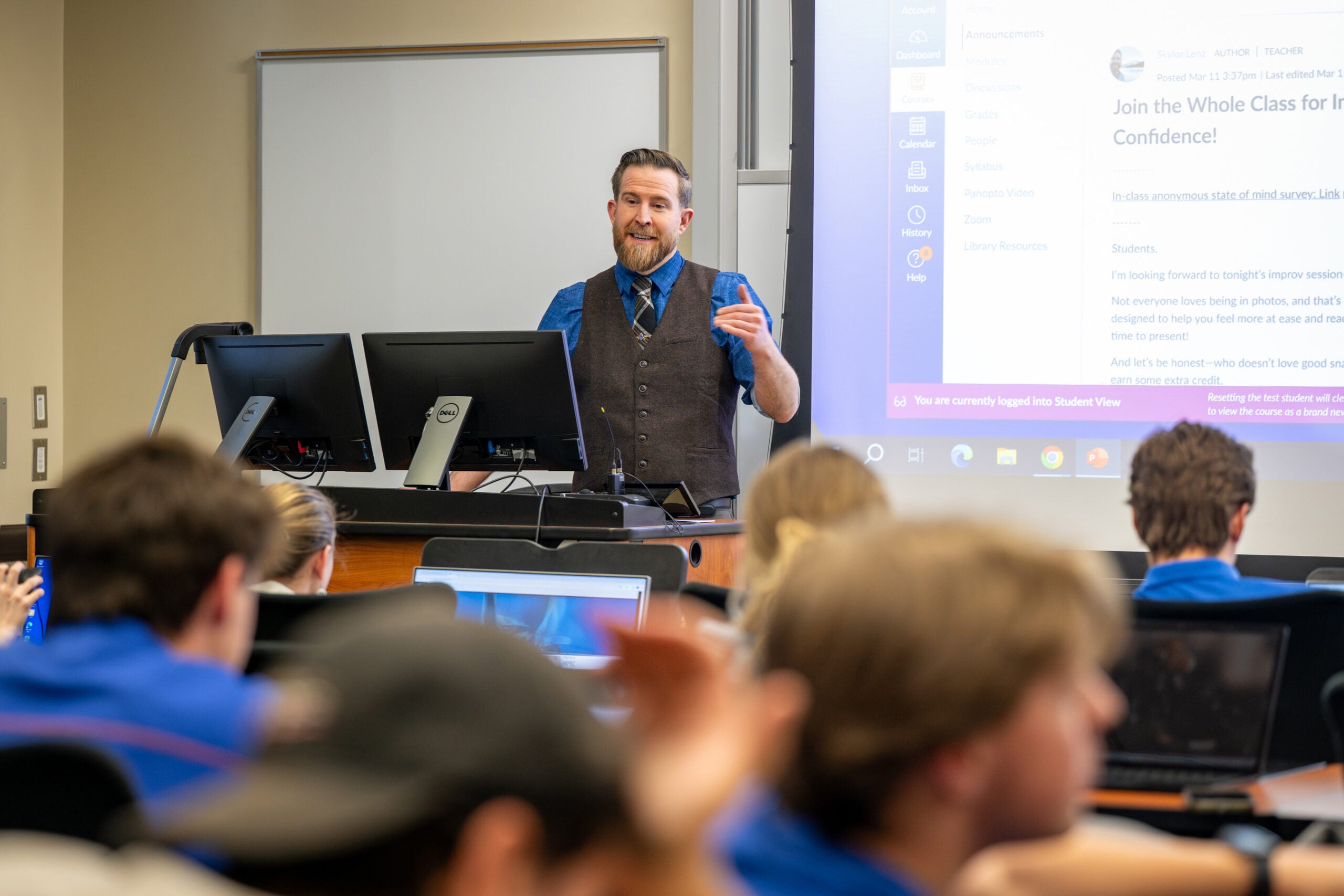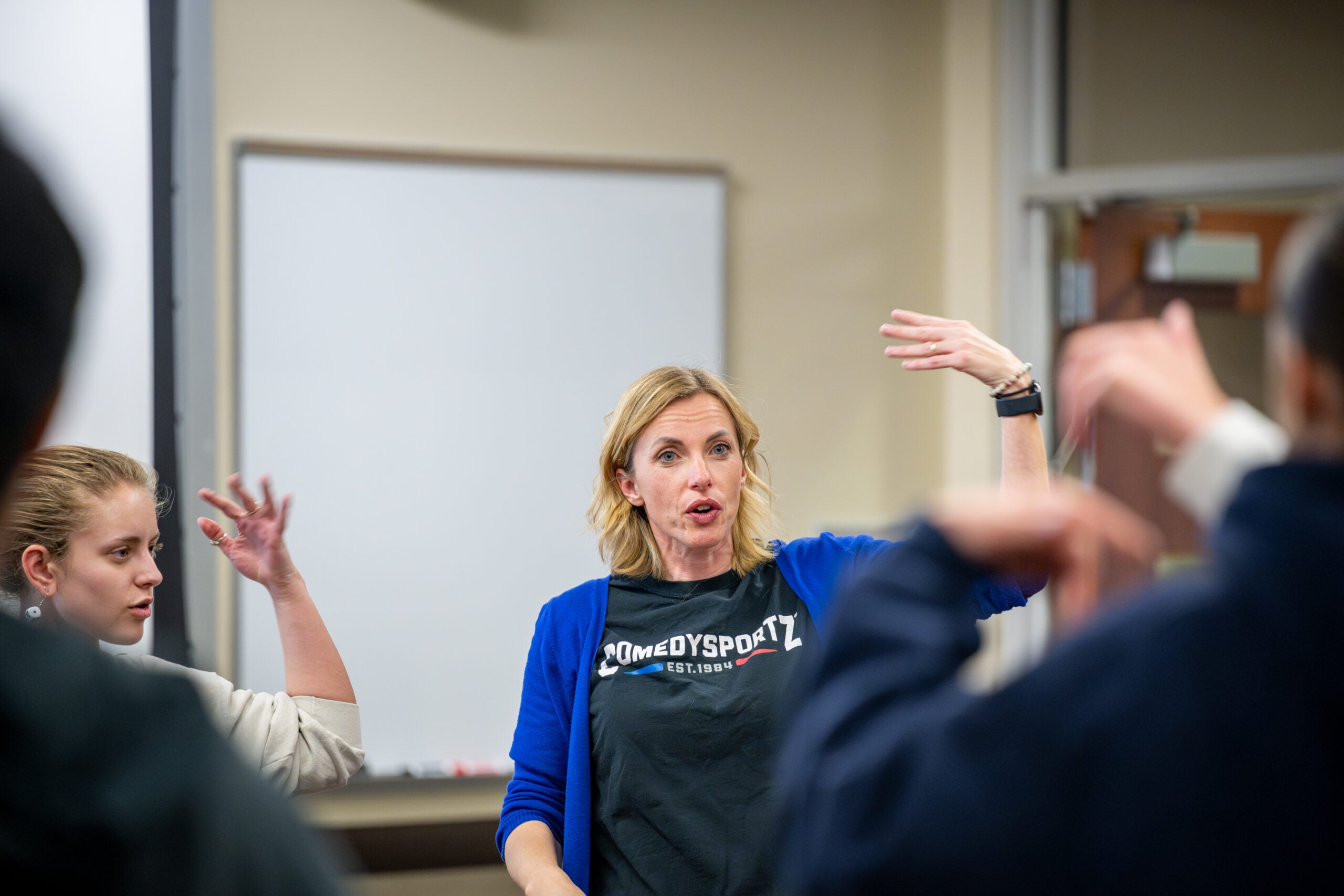
Boise State College of Business and Economics students were met with a surprise when they showed up on the first day of Information Technology Management 310: Business Intelligence. Forget kicking things off with a syllabus and course objectives review – instructor Skylor Lenz told the class they would try improv. Under the guidance of guest Karen Manthey, artistic director of ComedySportz: Boise, the students dove into a series of improv exercises that reinforced key lessons: embracing failure, building on others’ ideas and fostering teamwork.
Improv in a business class? How does it fit?
Improv as a business tool
“To start, it’s a great way to break the ice. During the class it gives students space for vulnerability and transparency,” said Lenz, adjunct instructor for information technology management. “After the improv exercises, I tell the students they’ve now overcome the hardest part of their final project: working in new groups, handling unexpected obstacles and presenting in front of everyone. It’s very empowering and a little goofy. Even if a student is hesitant about the experience, they’ve bonded with their classmates, and now they have that connection.”
Improv skills are helpful not only in class but also in the business world. Many notable business schools, including MIT, Stanford, and Wharton, incorporate improv into their curriculum. Studies show that improv training can unite teams and engage employees in the workplace.

Lenz is a strategy manager for Bragg Live Food Products, which is known for its Organic Apple Cider Vinegar. Before this role, he honed his expertise in consumer behavior analysis at Circana, measuring and accelerating demand for a wide range of brands. While working full-time and completing his MBA, he discovered improv as a creative outlet. After completing a series of improv classes, he ultimately joined an improv troupe.
“I’ve discovered that improv skills often seamlessly transfer to everyday life, opening countless opportunities to apply what I’ve learned,” he said. “Although stepping on stage can be intimidating, improv forces you to leave your comfort zone. The experience has fueled profound personal growth and enduring camaraderie.”
Real-world data insights
However, improv isn’t what the ITM 310 class is about. It’s an IT management class centered on learning about information technology resources and concepts. The class progresses toward a final project, where student groups analyze raw data to generate insights, creating a data-driven story that culminates in a class presentation. Opening with improv is just one example of how Lenz makes the class applicable and interesting. He also invites speakers who provide real-world context for data’s value in any job.
One speaker is an intelligence analyst who uses data to fight crime. He shares an example of cracking a murder case by digging through trash and recording receipt timestamps in an Excel spreadsheet. This analysis revealed data patterns that helped him trace a series of murders to a restaurant run by the leaders of a crime ring.
“I want students to realize that data analytics has the power to go beyond influencing consumer behavior. It’s a skill set that can build meaningful solutions, drive change and solve complex problems that benefit society,” Lenz said. “My purpose is to help them become double-headed dragons who can understand the raw data and then speak to it. If they can accomplish this, they can work toward evidence-based decision-making that results in tangible, positive outcomes.”

Lessons learned from improv
After the first day’s improv exercises, Lenz asked the students to do some homework and share what they learned from the improv session. He compiled their responses using AI and shared the results in the next class session. This year, five key themes emerged. Through improv, students found confidence, quick thinking, teamwork, acceptance of failure and connection – all while having fun. The class also sent a thank you card to the improv instructor.
“In the card, one student wrote, ‘Thank you for making us more confident,’” Lenz said. “In business, confidence is foundational.”